Assignment - Ethical Dilemma
VerifiedAdded on 2022/08/19
|10
|2683
|14
AI Summary
Contribute Materials
Your contribution can guide someone’s learning journey. Share your
documents today.
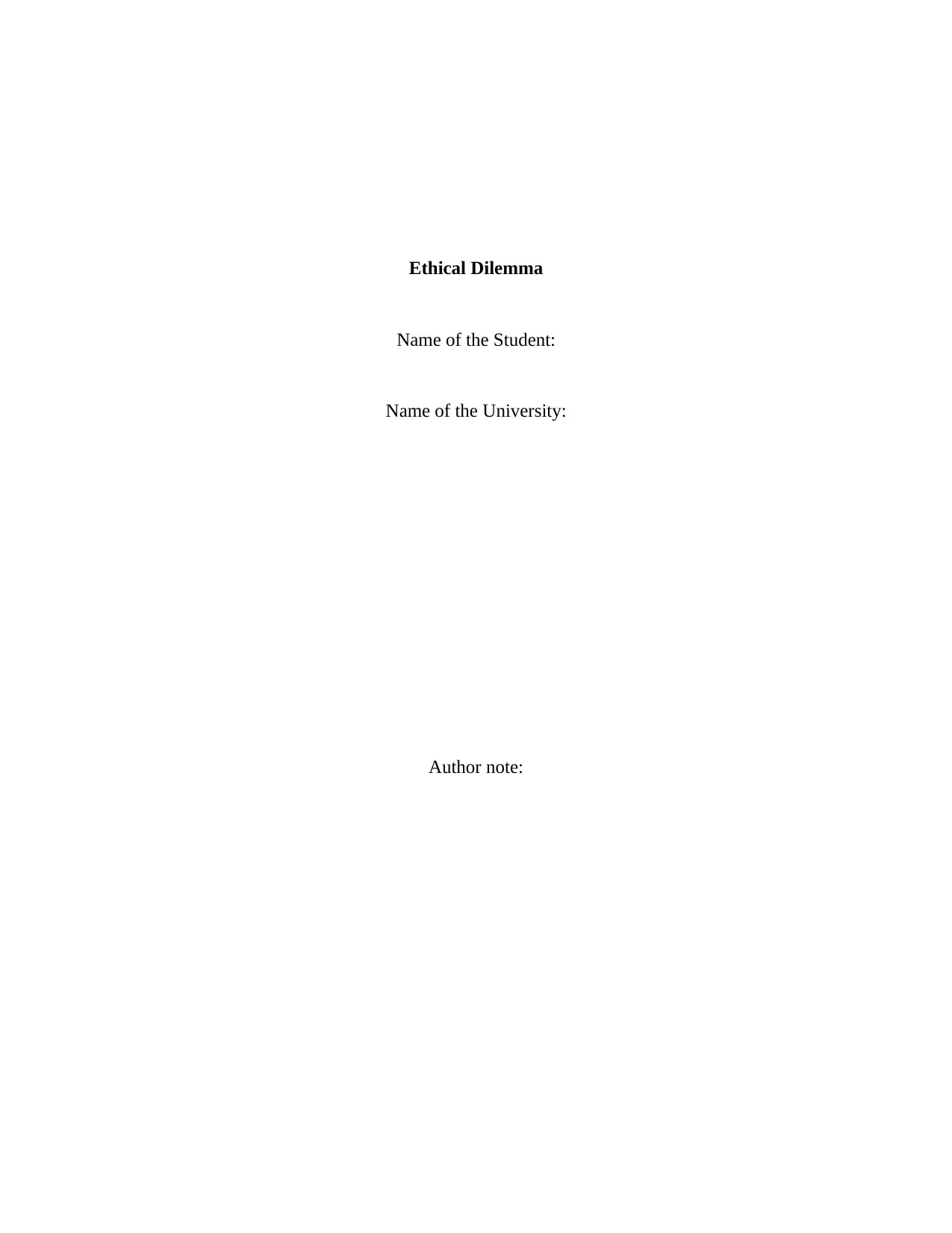
Ethical Dilemma
Name of the Student:
Name of the University:
Author note:
Name of the Student:
Name of the University:
Author note:
Secure Best Marks with AI Grader
Need help grading? Try our AI Grader for instant feedback on your assignments.
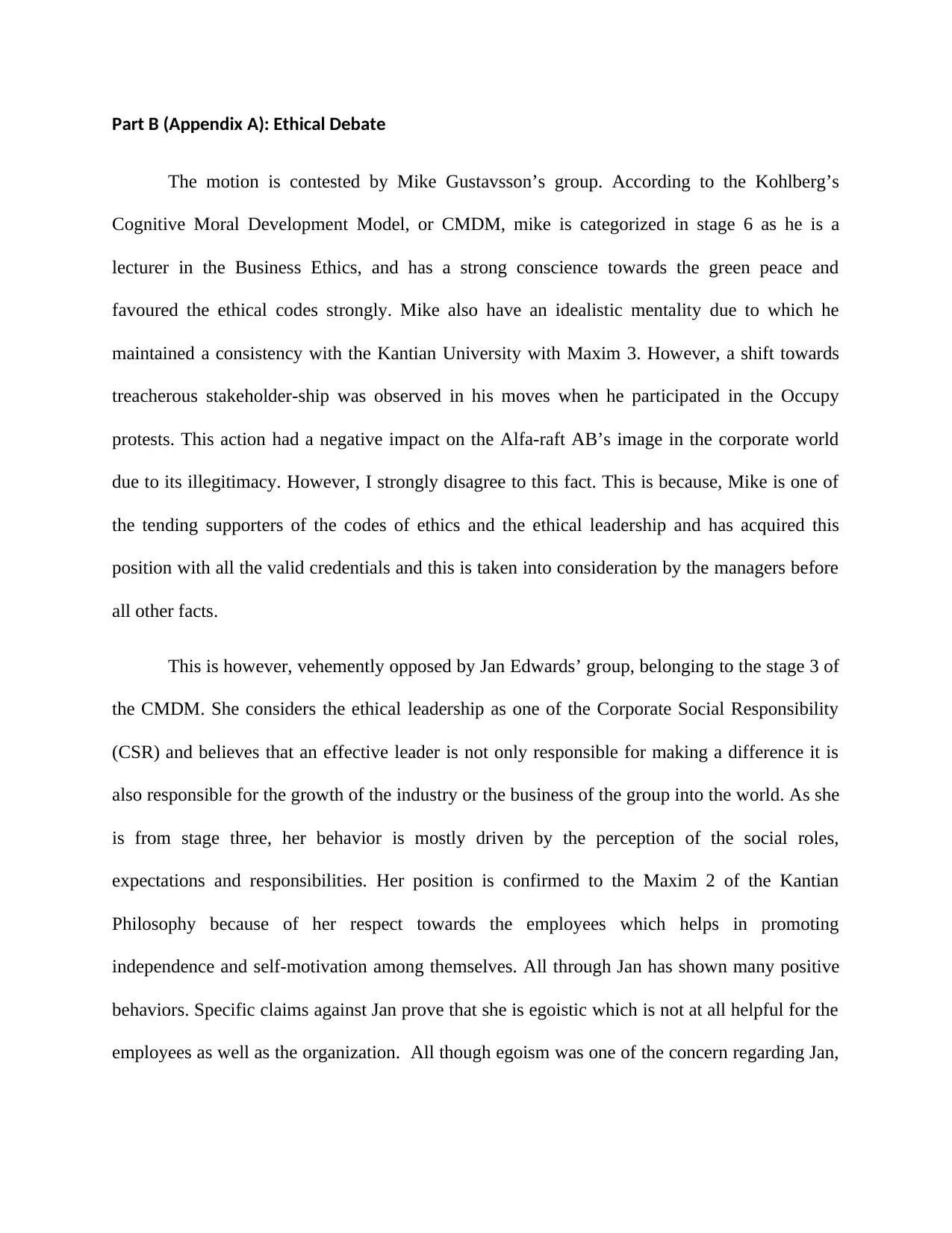
Part B (Appendix A): Ethical Debate
The motion is contested by Mike Gustavsson’s group. According to the Kohlberg’s
Cognitive Moral Development Model, or CMDM, mike is categorized in stage 6 as he is a
lecturer in the Business Ethics, and has a strong conscience towards the green peace and
favoured the ethical codes strongly. Mike also have an idealistic mentality due to which he
maintained a consistency with the Kantian University with Maxim 3. However, a shift towards
treacherous stakeholder-ship was observed in his moves when he participated in the Occupy
protests. This action had a negative impact on the Alfa-raft AB’s image in the corporate world
due to its illegitimacy. However, I strongly disagree to this fact. This is because, Mike is one of
the tending supporters of the codes of ethics and the ethical leadership and has acquired this
position with all the valid credentials and this is taken into consideration by the managers before
all other facts.
This is however, vehemently opposed by Jan Edwards’ group, belonging to the stage 3 of
the CMDM. She considers the ethical leadership as one of the Corporate Social Responsibility
(CSR) and believes that an effective leader is not only responsible for making a difference it is
also responsible for the growth of the industry or the business of the group into the world. As she
is from stage three, her behavior is mostly driven by the perception of the social roles,
expectations and responsibilities. Her position is confirmed to the Maxim 2 of the Kantian
Philosophy because of her respect towards the employees which helps in promoting
independence and self-motivation among themselves. All through Jan has shown many positive
behaviors. Specific claims against Jan prove that she is egoistic which is not at all helpful for the
employees as well as the organization. All though egoism was one of the concern regarding Jan,
The motion is contested by Mike Gustavsson’s group. According to the Kohlberg’s
Cognitive Moral Development Model, or CMDM, mike is categorized in stage 6 as he is a
lecturer in the Business Ethics, and has a strong conscience towards the green peace and
favoured the ethical codes strongly. Mike also have an idealistic mentality due to which he
maintained a consistency with the Kantian University with Maxim 3. However, a shift towards
treacherous stakeholder-ship was observed in his moves when he participated in the Occupy
protests. This action had a negative impact on the Alfa-raft AB’s image in the corporate world
due to its illegitimacy. However, I strongly disagree to this fact. This is because, Mike is one of
the tending supporters of the codes of ethics and the ethical leadership and has acquired this
position with all the valid credentials and this is taken into consideration by the managers before
all other facts.
This is however, vehemently opposed by Jan Edwards’ group, belonging to the stage 3 of
the CMDM. She considers the ethical leadership as one of the Corporate Social Responsibility
(CSR) and believes that an effective leader is not only responsible for making a difference it is
also responsible for the growth of the industry or the business of the group into the world. As she
is from stage three, her behavior is mostly driven by the perception of the social roles,
expectations and responsibilities. Her position is confirmed to the Maxim 2 of the Kantian
Philosophy because of her respect towards the employees which helps in promoting
independence and self-motivation among themselves. All through Jan has shown many positive
behaviors. Specific claims against Jan prove that she is egoistic which is not at all helpful for the
employees as well as the organization. All though egoism was one of the concern regarding Jan,
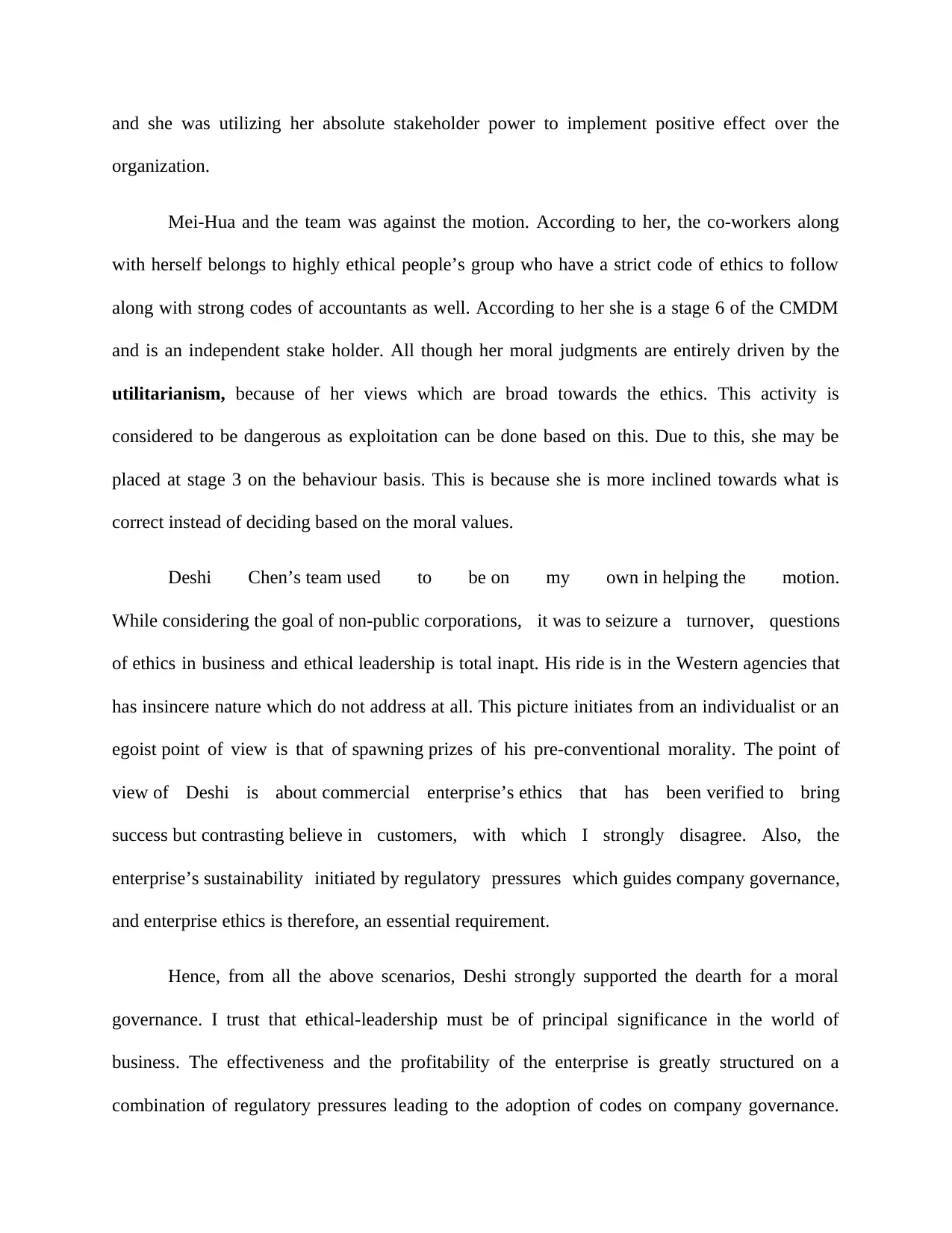
and she was utilizing her absolute stakeholder power to implement positive effect over the
organization.
Mei-Hua and the team was against the motion. According to her, the co-workers along
with herself belongs to highly ethical people’s group who have a strict code of ethics to follow
along with strong codes of accountants as well. According to her she is a stage 6 of the CMDM
and is an independent stake holder. All though her moral judgments are entirely driven by the
utilitarianism, because of her views which are broad towards the ethics. This activity is
considered to be dangerous as exploitation can be done based on this. Due to this, she may be
placed at stage 3 on the behaviour basis. This is because she is more inclined towards what is
correct instead of deciding based on the moral values.
Deshi Chen’s team used to be on my own in helping the motion.
While considering the goal of non-public corporations, it was to seizure a turnover, questions
of ethics in business and ethical leadership is total inapt. His ride is in the Western agencies that
has insincere nature which do not address at all. This picture initiates from an individualist or an
egoist point of view is that of spawning prizes of his pre-conventional morality. The point of
view of Deshi is about commercial enterprise’s ethics that has been verified to bring
success but contrasting believe in customers, with which I strongly disagree. Also, the
enterprise’s sustainability initiated by regulatory pressures which guides company governance,
and enterprise ethics is therefore, an essential requirement.
Hence, from all the above scenarios, Deshi strongly supported the dearth for a moral
governance. I trust that ethical-leadership must be of principal significance in the world of
business. The effectiveness and the profitability of the enterprise is greatly structured on a
combination of regulatory pressures leading to the adoption of codes on company governance.
organization.
Mei-Hua and the team was against the motion. According to her, the co-workers along
with herself belongs to highly ethical people’s group who have a strict code of ethics to follow
along with strong codes of accountants as well. According to her she is a stage 6 of the CMDM
and is an independent stake holder. All though her moral judgments are entirely driven by the
utilitarianism, because of her views which are broad towards the ethics. This activity is
considered to be dangerous as exploitation can be done based on this. Due to this, she may be
placed at stage 3 on the behaviour basis. This is because she is more inclined towards what is
correct instead of deciding based on the moral values.
Deshi Chen’s team used to be on my own in helping the motion.
While considering the goal of non-public corporations, it was to seizure a turnover, questions
of ethics in business and ethical leadership is total inapt. His ride is in the Western agencies that
has insincere nature which do not address at all. This picture initiates from an individualist or an
egoist point of view is that of spawning prizes of his pre-conventional morality. The point of
view of Deshi is about commercial enterprise’s ethics that has been verified to bring
success but contrasting believe in customers, with which I strongly disagree. Also, the
enterprise’s sustainability initiated by regulatory pressures which guides company governance,
and enterprise ethics is therefore, an essential requirement.
Hence, from all the above scenarios, Deshi strongly supported the dearth for a moral
governance. I trust that ethical-leadership must be of principal significance in the world of
business. The effectiveness and the profitability of the enterprise is greatly structured on a
combination of regulatory pressures leading to the adoption of codes on company governance.
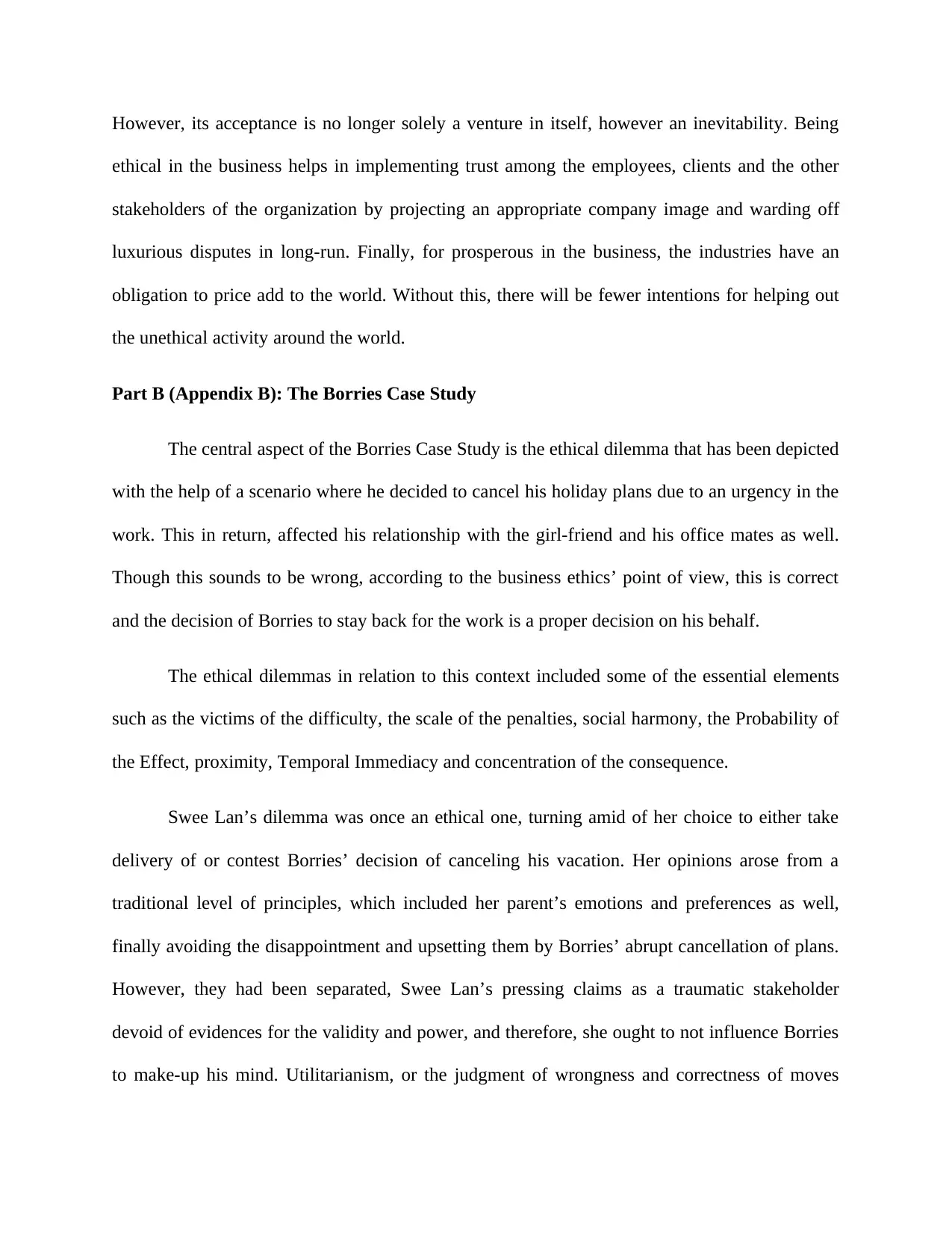
However, its acceptance is no longer solely a venture in itself, however an inevitability. Being
ethical in the business helps in implementing trust among the employees, clients and the other
stakeholders of the organization by projecting an appropriate company image and warding off
luxurious disputes in long-run. Finally, for prosperous in the business, the industries have an
obligation to price add to the world. Without this, there will be fewer intentions for helping out
the unethical activity around the world.
Part B (Appendix B): The Borries Case Study
The central aspect of the Borries Case Study is the ethical dilemma that has been depicted
with the help of a scenario where he decided to cancel his holiday plans due to an urgency in the
work. This in return, affected his relationship with the girl-friend and his office mates as well.
Though this sounds to be wrong, according to the business ethics’ point of view, this is correct
and the decision of Borries to stay back for the work is a proper decision on his behalf.
The ethical dilemmas in relation to this context included some of the essential elements
such as the victims of the difficulty, the scale of the penalties, social harmony, the Probability of
the Effect, proximity, Temporal Immediacy and concentration of the consequence.
Swee Lan’s dilemma was once an ethical one, turning amid of her choice to either take
delivery of or contest Borries’ decision of canceling his vacation. Her opinions arose from a
traditional level of principles, which included her parent’s emotions and preferences as well,
finally avoiding the disappointment and upsetting them by Borries’ abrupt cancellation of plans.
However, they had been separated, Swee Lan’s pressing claims as a traumatic stakeholder
devoid of evidences for the validity and power, and therefore, she ought to not influence Borries
to make-up his mind. Utilitarianism, or the judgment of wrongness and correctness of moves
ethical in the business helps in implementing trust among the employees, clients and the other
stakeholders of the organization by projecting an appropriate company image and warding off
luxurious disputes in long-run. Finally, for prosperous in the business, the industries have an
obligation to price add to the world. Without this, there will be fewer intentions for helping out
the unethical activity around the world.
Part B (Appendix B): The Borries Case Study
The central aspect of the Borries Case Study is the ethical dilemma that has been depicted
with the help of a scenario where he decided to cancel his holiday plans due to an urgency in the
work. This in return, affected his relationship with the girl-friend and his office mates as well.
Though this sounds to be wrong, according to the business ethics’ point of view, this is correct
and the decision of Borries to stay back for the work is a proper decision on his behalf.
The ethical dilemmas in relation to this context included some of the essential elements
such as the victims of the difficulty, the scale of the penalties, social harmony, the Probability of
the Effect, proximity, Temporal Immediacy and concentration of the consequence.
Swee Lan’s dilemma was once an ethical one, turning amid of her choice to either take
delivery of or contest Borries’ decision of canceling his vacation. Her opinions arose from a
traditional level of principles, which included her parent’s emotions and preferences as well,
finally avoiding the disappointment and upsetting them by Borries’ abrupt cancellation of plans.
However, they had been separated, Swee Lan’s pressing claims as a traumatic stakeholder
devoid of evidences for the validity and power, and therefore, she ought to not influence Borries
to make-up his mind. Utilitarianism, or the judgment of wrongness and correctness of moves
Secure Best Marks with AI Grader
Need help grading? Try our AI Grader for instant feedback on your assignments.
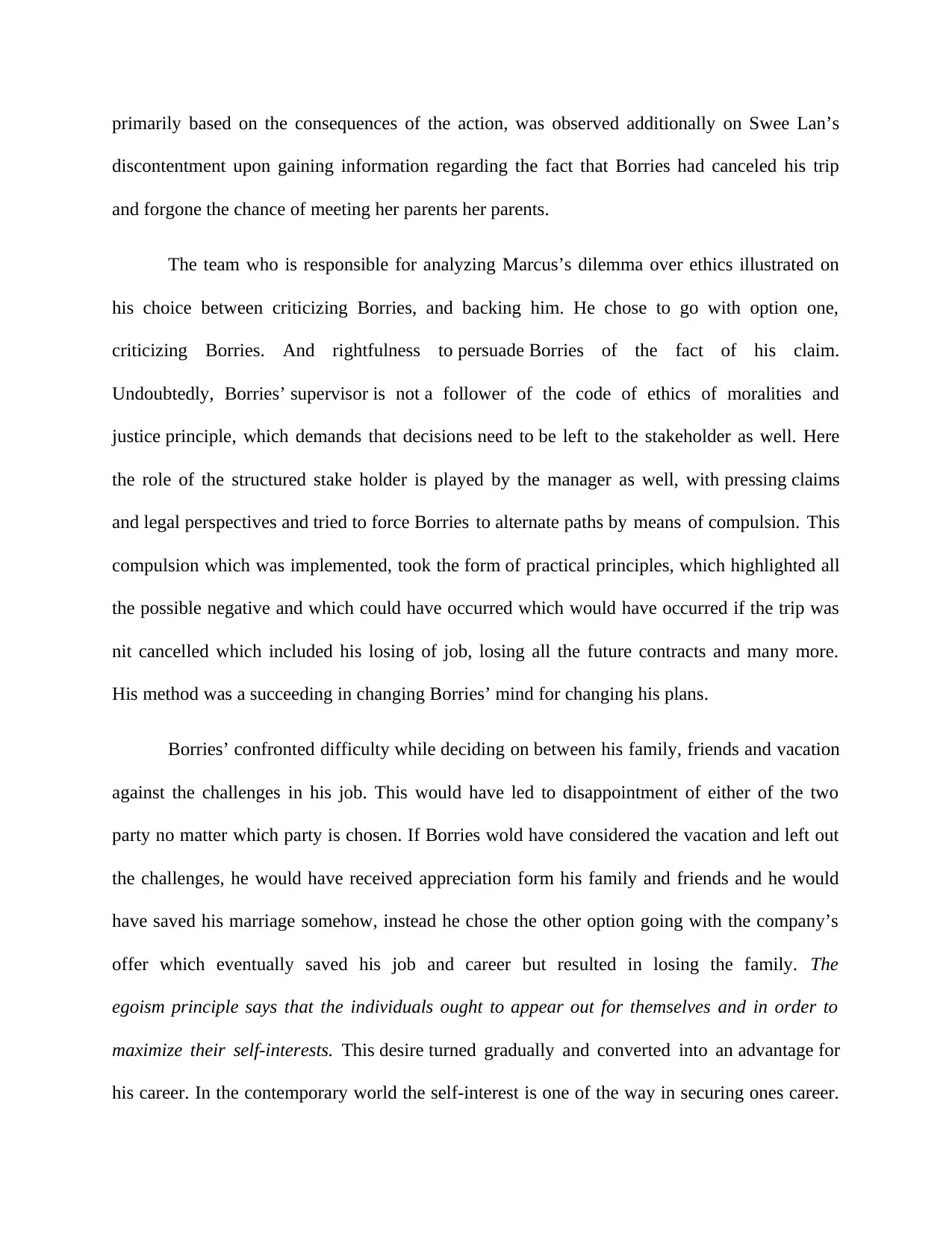
primarily based on the consequences of the action, was observed additionally on Swee Lan’s
discontentment upon gaining information regarding the fact that Borries had canceled his trip
and forgone the chance of meeting her parents her parents.
The team who is responsible for analyzing Marcus’s dilemma over ethics illustrated on
his choice between criticizing Borries, and backing him. He chose to go with option one,
criticizing Borries. And rightfulness to persuade Borries of the fact of his claim.
Undoubtedly, Borries’ supervisor is not a follower of the code of ethics of moralities and
justice principle, which demands that decisions need to be left to the stakeholder as well. Here
the role of the structured stake holder is played by the manager as well, with pressing claims
and legal perspectives and tried to force Borries to alternate paths by means of compulsion. This
compulsion which was implemented, took the form of practical principles, which highlighted all
the possible negative and which could have occurred which would have occurred if the trip was
nit cancelled which included his losing of job, losing all the future contracts and many more.
His method was a succeeding in changing Borries’ mind for changing his plans.
Borries’ confronted difficulty while deciding on between his family, friends and vacation
against the challenges in his job. This would have led to disappointment of either of the two
party no matter which party is chosen. If Borries wold have considered the vacation and left out
the challenges, he would have received appreciation form his family and friends and he would
have saved his marriage somehow, instead he chose the other option going with the company’s
offer which eventually saved his job and career but resulted in losing the family. The
egoism principle says that the individuals ought to appear out for themselves and in order to
maximize their self-interests. This desire turned gradually and converted into an advantage for
his career. In the contemporary world the self-interest is one of the way in securing ones career.
discontentment upon gaining information regarding the fact that Borries had canceled his trip
and forgone the chance of meeting her parents her parents.
The team who is responsible for analyzing Marcus’s dilemma over ethics illustrated on
his choice between criticizing Borries, and backing him. He chose to go with option one,
criticizing Borries. And rightfulness to persuade Borries of the fact of his claim.
Undoubtedly, Borries’ supervisor is not a follower of the code of ethics of moralities and
justice principle, which demands that decisions need to be left to the stakeholder as well. Here
the role of the structured stake holder is played by the manager as well, with pressing claims
and legal perspectives and tried to force Borries to alternate paths by means of compulsion. This
compulsion which was implemented, took the form of practical principles, which highlighted all
the possible negative and which could have occurred which would have occurred if the trip was
nit cancelled which included his losing of job, losing all the future contracts and many more.
His method was a succeeding in changing Borries’ mind for changing his plans.
Borries’ confronted difficulty while deciding on between his family, friends and vacation
against the challenges in his job. This would have led to disappointment of either of the two
party no matter which party is chosen. If Borries wold have considered the vacation and left out
the challenges, he would have received appreciation form his family and friends and he would
have saved his marriage somehow, instead he chose the other option going with the company’s
offer which eventually saved his job and career but resulted in losing the family. The
egoism principle says that the individuals ought to appear out for themselves and in order to
maximize their self-interests. This desire turned gradually and converted into an advantage for
his career. In the contemporary world the self-interest is one of the way in securing ones career.
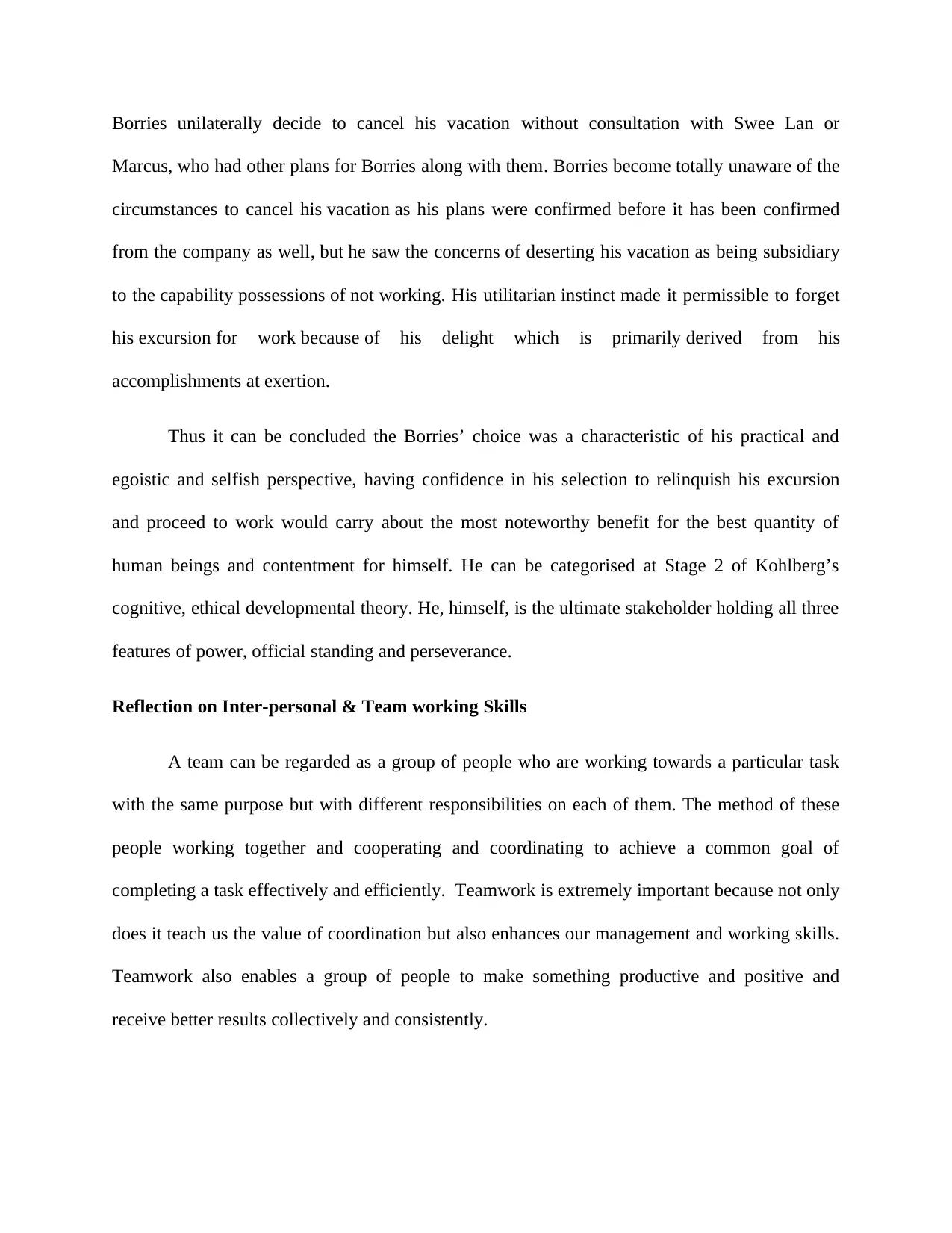
Borries unilaterally decide to cancel his vacation without consultation with Swee Lan or
Marcus, who had other plans for Borries along with them. Borries become totally unaware of the
circumstances to cancel his vacation as his plans were confirmed before it has been confirmed
from the company as well, but he saw the concerns of deserting his vacation as being subsidiary
to the capability possessions of not working. His utilitarian instinct made it permissible to forget
his excursion for work because of his delight which is primarily derived from his
accomplishments at exertion.
Thus it can be concluded the Borries’ choice was a characteristic of his practical and
egoistic and selfish perspective, having confidence in his selection to relinquish his excursion
and proceed to work would carry about the most noteworthy benefit for the best quantity of
human beings and contentment for himself. He can be categorised at Stage 2 of Kohlberg’s
cognitive, ethical developmental theory. He, himself, is the ultimate stakeholder holding all three
features of power, official standing and perseverance.
Reflection on Inter-personal & Team working Skills
A team can be regarded as a group of people who are working towards a particular task
with the same purpose but with different responsibilities on each of them. The method of these
people working together and cooperating and coordinating to achieve a common goal of
completing a task effectively and efficiently. Teamwork is extremely important because not only
does it teach us the value of coordination but also enhances our management and working skills.
Teamwork also enables a group of people to make something productive and positive and
receive better results collectively and consistently.
Marcus, who had other plans for Borries along with them. Borries become totally unaware of the
circumstances to cancel his vacation as his plans were confirmed before it has been confirmed
from the company as well, but he saw the concerns of deserting his vacation as being subsidiary
to the capability possessions of not working. His utilitarian instinct made it permissible to forget
his excursion for work because of his delight which is primarily derived from his
accomplishments at exertion.
Thus it can be concluded the Borries’ choice was a characteristic of his practical and
egoistic and selfish perspective, having confidence in his selection to relinquish his excursion
and proceed to work would carry about the most noteworthy benefit for the best quantity of
human beings and contentment for himself. He can be categorised at Stage 2 of Kohlberg’s
cognitive, ethical developmental theory. He, himself, is the ultimate stakeholder holding all three
features of power, official standing and perseverance.
Reflection on Inter-personal & Team working Skills
A team can be regarded as a group of people who are working towards a particular task
with the same purpose but with different responsibilities on each of them. The method of these
people working together and cooperating and coordinating to achieve a common goal of
completing a task effectively and efficiently. Teamwork is extremely important because not only
does it teach us the value of coordination but also enhances our management and working skills.
Teamwork also enables a group of people to make something productive and positive and
receive better results collectively and consistently.
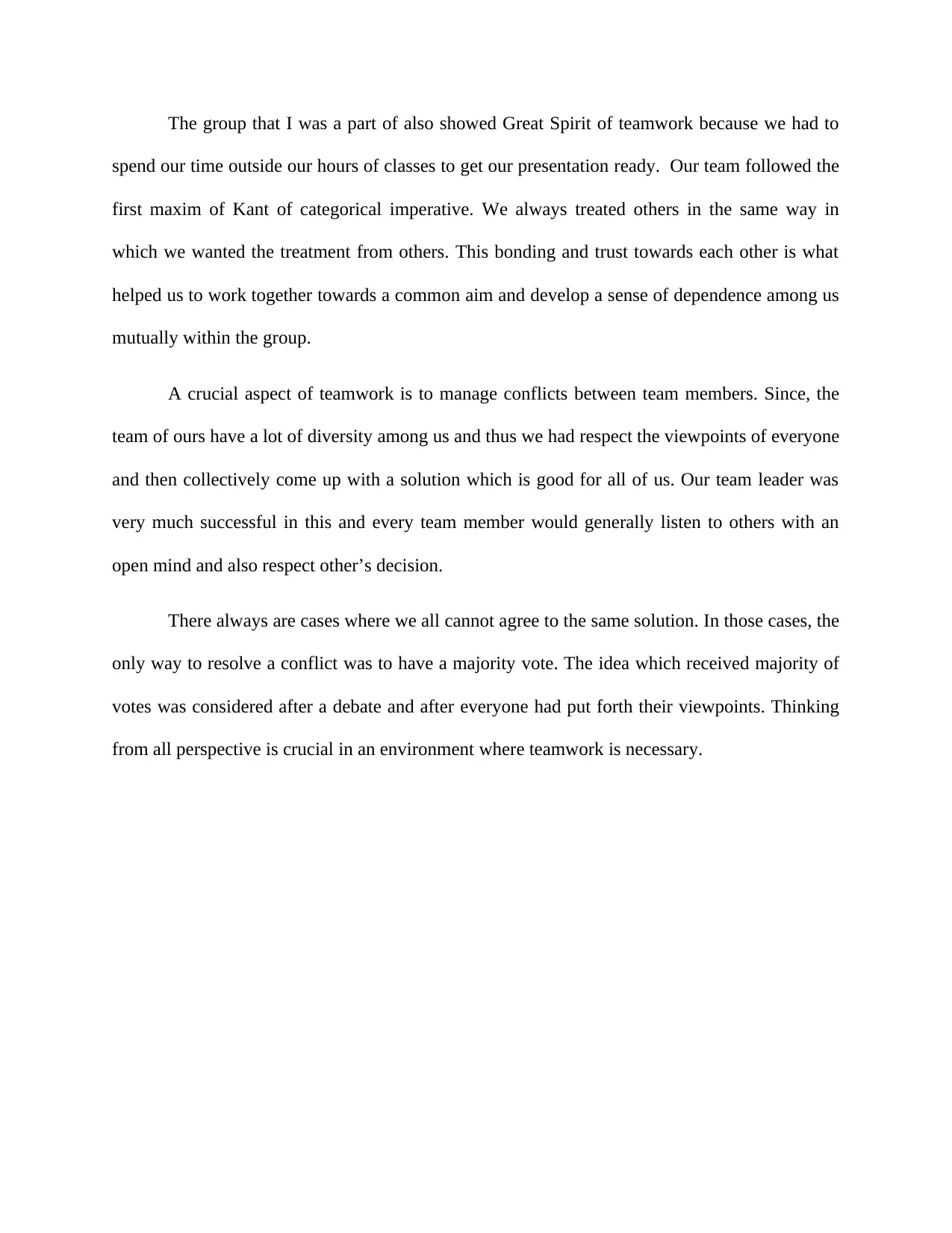
The group that I was a part of also showed Great Spirit of teamwork because we had to
spend our time outside our hours of classes to get our presentation ready. Our team followed the
first maxim of Kant of categorical imperative. We always treated others in the same way in
which we wanted the treatment from others. This bonding and trust towards each other is what
helped us to work together towards a common aim and develop a sense of dependence among us
mutually within the group.
A crucial aspect of teamwork is to manage conflicts between team members. Since, the
team of ours have a lot of diversity among us and thus we had respect the viewpoints of everyone
and then collectively come up with a solution which is good for all of us. Our team leader was
very much successful in this and every team member would generally listen to others with an
open mind and also respect other’s decision.
There always are cases where we all cannot agree to the same solution. In those cases, the
only way to resolve a conflict was to have a majority vote. The idea which received majority of
votes was considered after a debate and after everyone had put forth their viewpoints. Thinking
from all perspective is crucial in an environment where teamwork is necessary.
spend our time outside our hours of classes to get our presentation ready. Our team followed the
first maxim of Kant of categorical imperative. We always treated others in the same way in
which we wanted the treatment from others. This bonding and trust towards each other is what
helped us to work together towards a common aim and develop a sense of dependence among us
mutually within the group.
A crucial aspect of teamwork is to manage conflicts between team members. Since, the
team of ours have a lot of diversity among us and thus we had respect the viewpoints of everyone
and then collectively come up with a solution which is good for all of us. Our team leader was
very much successful in this and every team member would generally listen to others with an
open mind and also respect other’s decision.
There always are cases where we all cannot agree to the same solution. In those cases, the
only way to resolve a conflict was to have a majority vote. The idea which received majority of
votes was considered after a debate and after everyone had put forth their viewpoints. Thinking
from all perspective is crucial in an environment where teamwork is necessary.
Paraphrase This Document
Need a fresh take? Get an instant paraphrase of this document with our AI Paraphraser

References:
Ahmad, N., Ansari, M., & Aafaqi, R. (2005). ETHICAL REASONING: THE IMPACT OF
ETHICAL DILEMMA, EGOISM AND BELIEF IN JUST WORLD. Asian Academy of
Management Journal, 10.
Brill, N. I. (1976). Teamwork: Working Together in the Human Services. Oxford: Oxford
University Press.
Bykvist, K. (2010). Utilitarianism: A Guide for the Perplexed. New York: Continuum
International Publishing Group.
Chuwa, L. T. (2014). African Indigenous Ethics in Global Bioethics: Interpreting Ubuntu (2014
edition). New York: Springer.
Conti, B., & Kleiner, B. H. (1997). How to increase teamwork in organizations. Training for
Quality. https://doi.org/10.1108/09684879710156496
Crane, A., & Matten, D. (2016). Business Ethics: Managing Corporate Citizenship and
Sustainability in the Age of Globalization. Oxford: Oxford University Press.
Fredrick, T. A. (2008). Facilitating Better Teamwork: Analyzing the Challenges and Strategies
of Classroom-Based Collaboration. Business Communication Quarterly, 71(4), 439–455.
https://doi.org/10.1177/1080569908325860
Idowu, S. O., & Caliyurt, K. T. (Eds.). (2014). Corporate Governance: An International
Perspective. Retrieved from https://www.springer.com/gp/book/9783642451669
Jaworski, B. J., & Kohli, A. K. (1993). Market Orientation: Antecedents and Consequences.
Journal of Marketing, 57(3), 53–70. https://doi.org/10.2307/1251854
Ahmad, N., Ansari, M., & Aafaqi, R. (2005). ETHICAL REASONING: THE IMPACT OF
ETHICAL DILEMMA, EGOISM AND BELIEF IN JUST WORLD. Asian Academy of
Management Journal, 10.
Brill, N. I. (1976). Teamwork: Working Together in the Human Services. Oxford: Oxford
University Press.
Bykvist, K. (2010). Utilitarianism: A Guide for the Perplexed. New York: Continuum
International Publishing Group.
Chuwa, L. T. (2014). African Indigenous Ethics in Global Bioethics: Interpreting Ubuntu (2014
edition). New York: Springer.
Conti, B., & Kleiner, B. H. (1997). How to increase teamwork in organizations. Training for
Quality. https://doi.org/10.1108/09684879710156496
Crane, A., & Matten, D. (2016). Business Ethics: Managing Corporate Citizenship and
Sustainability in the Age of Globalization. Oxford: Oxford University Press.
Fredrick, T. A. (2008). Facilitating Better Teamwork: Analyzing the Challenges and Strategies
of Classroom-Based Collaboration. Business Communication Quarterly, 71(4), 439–455.
https://doi.org/10.1177/1080569908325860
Idowu, S. O., & Caliyurt, K. T. (Eds.). (2014). Corporate Governance: An International
Perspective. Retrieved from https://www.springer.com/gp/book/9783642451669
Jaworski, B. J., & Kohli, A. K. (1993). Market Orientation: Antecedents and Consequences.
Journal of Marketing, 57(3), 53–70. https://doi.org/10.2307/1251854

Jones, A., Richard, B., Paul, D., Sloane, K., & Peter, F. (2007). Effectiveness of teambuilding in
organization. Journal of Management, 5(3), 35–37.
Junarso, T. (2009). How To Become A Highly Effective Leader: Ten Skills A Leader Must
Possess. iUniverse.
Kohlberg, L. (1971). Groundwork of the metaphysics of morals (M. Gregor & J. Timmermann,
Trans.). Cambridge: Cambridge University Press.
Korsgaard, C. M. (Ed.). (2012). Kant: Groundwork of the Metaphysics of Morals (2 edition).
Cambridge: Cambridge University Press.
MacKinnon, B., & Fiala, A. (2014). Ethics: Theory and Contemporary Issues. New York:
Cengage Learning.
Mitchell, R. K., Agle, B. R., & Wood, D. J. (1997). Toward a Theory of Stakeholder
Identification and Salience: Defining the Principle of Who and What Really Counts. The
Academy of Management Review, 22(4), 853–886. https://doi.org/10.2307/259247
Shamoo, A. E., & Resnik, D. B. (2009). Responsible Conduct of Research (2 edition). Oxford ;
New York: Oxford University Press.
Seidman, D. (2004). The Case for Ethical Leadership. The Academy of Management Executive,
18(2),
134-138.
Thomas, L. (1980). Ethical Egoism and Psychological Dispositions. American Philosophical
Quarterly, 17(1), 73–78.
organization. Journal of Management, 5(3), 35–37.
Junarso, T. (2009). How To Become A Highly Effective Leader: Ten Skills A Leader Must
Possess. iUniverse.
Kohlberg, L. (1971). Groundwork of the metaphysics of morals (M. Gregor & J. Timmermann,
Trans.). Cambridge: Cambridge University Press.
Korsgaard, C. M. (Ed.). (2012). Kant: Groundwork of the Metaphysics of Morals (2 edition).
Cambridge: Cambridge University Press.
MacKinnon, B., & Fiala, A. (2014). Ethics: Theory and Contemporary Issues. New York:
Cengage Learning.
Mitchell, R. K., Agle, B. R., & Wood, D. J. (1997). Toward a Theory of Stakeholder
Identification and Salience: Defining the Principle of Who and What Really Counts. The
Academy of Management Review, 22(4), 853–886. https://doi.org/10.2307/259247
Shamoo, A. E., & Resnik, D. B. (2009). Responsible Conduct of Research (2 edition). Oxford ;
New York: Oxford University Press.
Seidman, D. (2004). The Case for Ethical Leadership. The Academy of Management Executive,
18(2),
134-138.
Thomas, L. (1980). Ethical Egoism and Psychological Dispositions. American Philosophical
Quarterly, 17(1), 73–78.

Treviño, L. K., Brown, M., & Hartman, L. P. (2003). A Qualitative Investigation of Perceived
Executive Ethical Leadership: Perceptions from Inside and Outside the Executive Suite.
Human Relations, 56(1), 5–37. https://doi.org/10.1177/0018726703056001448
Veenhoven, R. (2004). Happiness as an aim in public policy: The greatest happiness principle. In
P. A. Linley, S. Joseph, & M. E. P. Seligman (Eds.), Positive Psychology in Practice (1
edition, pp. 658–678). Hoboken, N.J: Wiley.
Wood, A. W. (2007). Kantian Ethics (1 edition). Cambridge ; New York: Cambridge University
Press.
Executive Ethical Leadership: Perceptions from Inside and Outside the Executive Suite.
Human Relations, 56(1), 5–37. https://doi.org/10.1177/0018726703056001448
Veenhoven, R. (2004). Happiness as an aim in public policy: The greatest happiness principle. In
P. A. Linley, S. Joseph, & M. E. P. Seligman (Eds.), Positive Psychology in Practice (1
edition, pp. 658–678). Hoboken, N.J: Wiley.
Wood, A. W. (2007). Kantian Ethics (1 edition). Cambridge ; New York: Cambridge University
Press.
1 out of 10
Related Documents
Your All-in-One AI-Powered Toolkit for Academic Success.
+13062052269
info@desklib.com
Available 24*7 on WhatsApp / Email
![[object Object]](/_next/static/media/star-bottom.7253800d.svg)
Unlock your academic potential
© 2024 | Zucol Services PVT LTD | All rights reserved.





